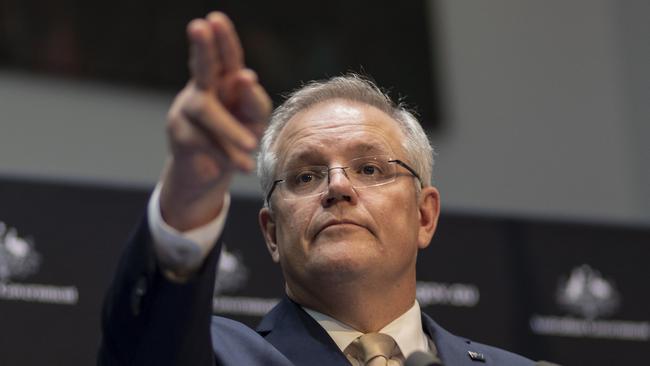Coronavirus pay cuts: This may make you very, very angry
It is morally indefensible that bureaucrats and politicians are not sharing the burden and continue to rake in the big bucks.

“We will get through this together … it’s no longer about entitlement, it’s about need,” Scott Morrison said on Thursday, in one of his almost daily briefings to the nation on the coronavirus crisis.
These are fine sentiments, but they clearly defy reality. Public sector workers are not suffering nearly to the same extent as those in the private sector, who ultimately pay their wages.
The destruction of millions of jobs and businesses that is now well in train will expose the extraordinarily high pay and conditions of the nation’s top public servants, state and federal, that typically leave foreigners and members of the public speechless.
In NSW alone, just one state, more than 3200 senior executives, none of them “frontline” staff, are paid between $200,000 and $500,000 a year. Victorian Premier Dan Andrews’s salary is set to rise by $47,000 to $441,000 in July, while backbenchers’ base salaries are set to rise by almost $20,000 to $182,400.
Not much sharing of the burden there. So far, the jobless are concentrated overwhelmingly among the young and lower-paid, but as household and business spending collapses, soon professionals will face big pay cuts too. Barely a fortnight into the shutdown, law and consulting firms are reducing and announcing lay-offs.
Asked on Thursday whether senior federal public servants and senior MPs might experience a pay cut as a way of sharing the burden, the Prime Minister said: “We’ve put the freezes in place.”
Forgoing a 2 per cent July increase on already enormous salaries is a scene from a Monty Python skit. The 3240-strong Senior Executive Service, for instance, will be keeping their $238,000-to-$453,000 salaries, not to mention the thousands of officials in federal and state regulators who earn at least as much.
Whatever the merits of the range of the extraordinary impositions on personal freedoms and future taxpayers, state and federal public servants, and the politicians who oversee them, should share some of the pain, especially since it’s government that has caused the economic collapse.
Oliver Lamb, whose business, Ailevon Pacific Aviation Consulting, has been severely affected by the restrictions, and who has just recovered from the coronavirus, said: “Leaders need to show by example that they are making sacrifices themselves.”
How much, though, is fraught. Many public servants, especially the senior ones, are working harder than they ever have. Understandably, frontline medical staff would demand exemptions.
Meanwhile, the pay of the judiciary — which is doing very little given that the courts are shut — can’t be cut at all under the Constitution. Moreover, in a crisis, ministers don’t want a disgruntled bureaucracy. In 1931, Britain cut public sector pay by 10 per cent, and the navy began to mutiny.
Some corporate executives will voluntarily take cuts; others won’t. Also, some businesses will make a killing out of the crisis — manufacturers of certain medical devices, for instance. Is it morally wrong to profit from a tragedy?
Perhaps a temporary higher rate of income tax cutting is the cleanest solution.
During the Depression, the Scullin government cut public sector pay by 20 per cent.
A uniform cut would seem draconian, causing real pain for the 100,000-odd junior federal public servants, for instance (who earn less than $100,000), and perhaps also for the 42,000 executives overseeing them (who earn between $130,000 and $175,000).
For the 30-odd department secretaries and agency leaders, though, on $700,000-plus, it would be bearable.
Whatever the ethical difficulties, if the economic downturn endures, the gap between public affluence and private squalor will grow, forcing politicians’ hands.
Queensland Premier Annastacia Palaszczuk froze a scheduled 2.5 per cent pay rise for Queensland public servants this week.
Perhaps the crisis will foster reform of pay relativities within the public sector itself. Australia’s departmental secretaries and agency heads, for instance, are the highest paid in the developed world, according to a 2015 OECD study, earning roughly double their counterparts in 28 other developed countries. And they’ve increased a lot since then.
The pay of taxpayer-funded political staff, around 1700 strong across states and federal government, is also gobsmacking, where advisers in their late 20s often earn $180,000-plus.
Other measures might include the cessation of indexing parliamentary and public servant defined benefit pensions, which might be means-tested, making lucrative board and advisory roles a bit less so.
Ultimately, what the government can pay depends on our prosperity. If tax revenues evaporate and debt mounts, some bureaucrats will be sacked and pay will be trimmed commensurately. The president of Argentina, once as rich as Australia, doesn’t earn a sixth of the Prime Minister’s $550,000 a year.
Indeed, this process is about to ricochet through universities, whose swollen ranks of highly paid administrators and quasi-academics won’t be so affordable without billions in revenue from Chinese students. Vice-chancellors may struggle to keep their $1m pay cheques.
Whatever happens, the crisis will change how young jobseekers weigh up their options. As in France, more of the best and brightest will aim for public rather than private sector jobs, with the attendant impact on innovation and economic growth.
It will provoke deeper thought about the value of work, too. The modern economy is teeming with highly paid roles, famously termed “bullshit jobs” by anthropologist David Graeber, which add little inherent value. In economies dominated by public and private bureaucracy, the idea of workers being paid their “marginal product of labour” — the neat concept in economics textbooks — is more and more a fairytale.
It’s still too early to expect politicians to force pay cuts on themselves and their senior officials. The drip feed of horrific economic statistics hasn’t begun yet, providing rhetorical backing to the disaster facing millions of Australians, whose businesses and livelihoods have been turned upside down in just a couple of weeks.
To be fair, any changes to public sector pay will do little to dent the $500bn of extra debt state and federal governments are set to take on. Cash wages and salaries of the entire commonwealth public sector amount to about $23bn a year, in an annual budget approaching $500bn. But morality will always trump economics in public debate.



